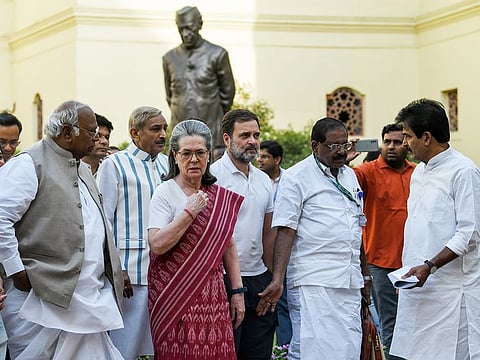India’s opposition faces uphill battle for equality
Restoring constitutional values in a time of escalating challenges and governance crises

Flourishing the Indian Constitution at the oath-taking in the rarefied sanctum of the Parliament is the easy part for the opposition. Breathing life into the promises of equality before the law for every Indian citizen, regardless of religion, making it a non-negotiable feature of our democracy, is tough going.
India’s ruling BJP government, even with a crucial dependence on alliance partners, has signalled that it will not change its maximalist style of governance. The insistence on the reappointment of Om Birla as the Speaker of the House — who has gone down in history as the Speaker who presided over the suspension of 146 opposition MPs during the tenure of the last Lok Sabha — is an indication of what we are in for.
Birla wasted no time shutting off the mic of Leader of Opposition, Rahul Gandhi, and Congress President, when they raised the organised scam of the leak of the question papers of the NEET examinations, which affect the lives and future of nearly a billion young people.
The epicentre of the NEET scandal is, unsurprisingly, the states of Gujarat and Bihar, and the centre under Modi seems reluctant to act.
A complicit mainstream media
For India, the past ten years of governance is a roller-coaster ride of knee-jerk decision-making, such as a demonetisation scheme which snuffed out 80 per cent of India’s currency at six hours notice, the Agniveer scheme which has caused widespread anger, the notification and then the repeal of the three farm Acts which made Punjab farmers lay siege to Delhi for a year in protest.
Similarly the pandemic lockdown which saw migrants hit the road in a tragedy with few parallels, and now the wholesale repeal of the Indian Penal Code with hastily drafted and minimally consulted new criminal laws are a case in point.
This is precisely what the opposition has to fight against because the minorities and the Dalits could be the prime targets of these new laws. Post-June 4, the day the election results were announced, six cases of mob lynching over beef have already occurred, and yet the complicit mainstream media is mum.
I asked two senior opposition leaders why they didn’t protest more vociferously considering their silence emboldened the bigots. The answers are a pointer to where Indian democracy is currently. First, they don’t want to be seen as appeasing minorities, a charge the BJP is itching to make and then stick against the opposition.
The leaders were unequivocal they would protest but try and ensure that the BJP does not get a handle. I then asked, “Why can’t you understand the simple thing. These are provocations, a testing of the waters, a signal to the faithful that nothing has changed from the past ten years.”
Finding a voice again
I got no answers, which should tell you a lot about how the opposition is currently clueless on how to up the ante against the gravest attacks against Indian minorities.
The second reason offered by the opposition is that India is in the grip of a worldwide swing to the right and to ensure electoral relevance, a different way has to be found to oppose a majoritarian agenda.
India has just recently seen critical exam papers leak, and roofs of hospitals leak, and tragically, the collapse of roofs in swanky airports. Here’s hoping the opposition can at least take on and ask the Modi government to fix accountability and punish those responsible.
Perhaps by finding a voice again, they might get to making equality of all citizens non-negotiable.




